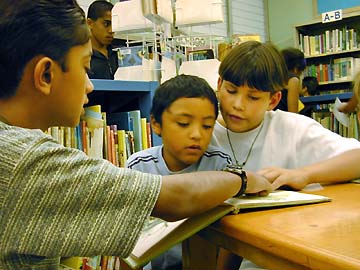Advertisement - Click to support our sponsors.


Reading puts pupils
on right pageA free summer reading
By Pat Gee
program at Makaha is
making a difference
Star-BulletinIn six days, fourth-grader Kristiana Hanohano has read 38 books.
She'd rather do that than stay home and watch TV like her brother Emil used to. But ever since he started coming with her to the free reading program at Makaha Elementary School, he loves to read, too.
None of the 87 children on a recent day at the program looked bored or restless, even though they were doing schoolwork while the beach was calling. The three-week pilot program began June 19.
The enthusiasm of principal Clarence De Lude, who dreamed up the program, has infected the kids and the 30-some volunteers who help teach them.
"The first week, some of the kids looked like they didn't want to be here," but that's all changed, he says.
The library buzzed with children reading to an adult or youth tutor. The kids tracked the words with stubby fingers and sounded them out carefully.
"This is my favorite part. I love to see them run for the books" when they are allowed to choose their own, says De Lude. He is a product of Makaha Elementary School and has a personal mission to give something back to the community in which he was raised.
Hands-on leadership
Glenn Kila, principal of Kaala Elementary, who also went to Makaha, feels the same way and volunteered to help as an administrator."Because both of us 'made it,' we wanted to help the community which has been voicing for years that they wanted a stronger reading program," Kila said.
Both principals get involved with the hands-on work, hunkering down on child-sized chairs and praising frequently with a "good job!" Their goal was to have students read 1,000 books at the end of three weeks, but they surpassed that number in the first week. The students get a "double dose of pure reading with two lessons a day," then take a book home to read with their parents, he said.
The program uses a technique called "Reading Mastery," which boils down to "I (the teacher) do it, we do it, they (students) do it."
"It's a very Hawaiian way to teach. That's how we were taught hula and everything we did," De Lude says.
Makaha parents are so proud that their kids are learning to read well, that many have volunteered to help at the school. This fulfills the second goal of the program, which is to train members of the community to teach reading to the children. Volunteers had to attend a two-day training session.
Community provides support
Kila said instead of hiring others from outside the Waianae community to come in and teach the children, he and De Lude believe they should be able to develop their own experts and supply their own support system.The community readily pitched in with transportation, food, teachers and volunteers.
Without community support, the program would have cost $27,000, but it is being run on only $6,000, De Lude said.
About 95 percent of the kids involved are of Hawaiian ancestry and are in grades 1 through 6, although one or two 8th-graders have joined.
'Critical problem'
Half the group reads far below their grade level and the other half has fallen only slightly behind. Difficulty with reading is a "critical problem, you need to be able to read for survival," De Lude said.One of his goals was to build self-esteem and confidence in students who had fallen behind in their classwork because of poor reading skills. Once they've completed the summer program, "when regular school commences, you've got different children," who are performing closer to their grade level, he said.
The program has been dedicated to Phoebe Saucerman, a VISTA worker who started helping Makaha's students with their reading when she retired two years ago. She passed her love of words on to her three grown children, all of whom went to Makaha Elementary, by reading with them every day.
Now she's proud that her four grandchildren are good readers because their parents read to them, too.